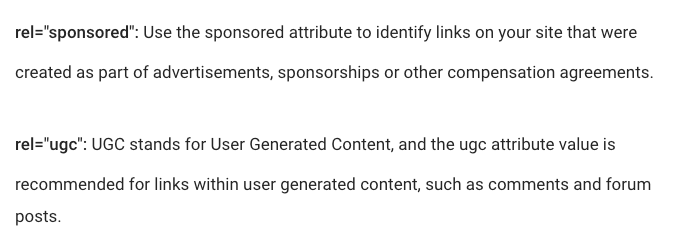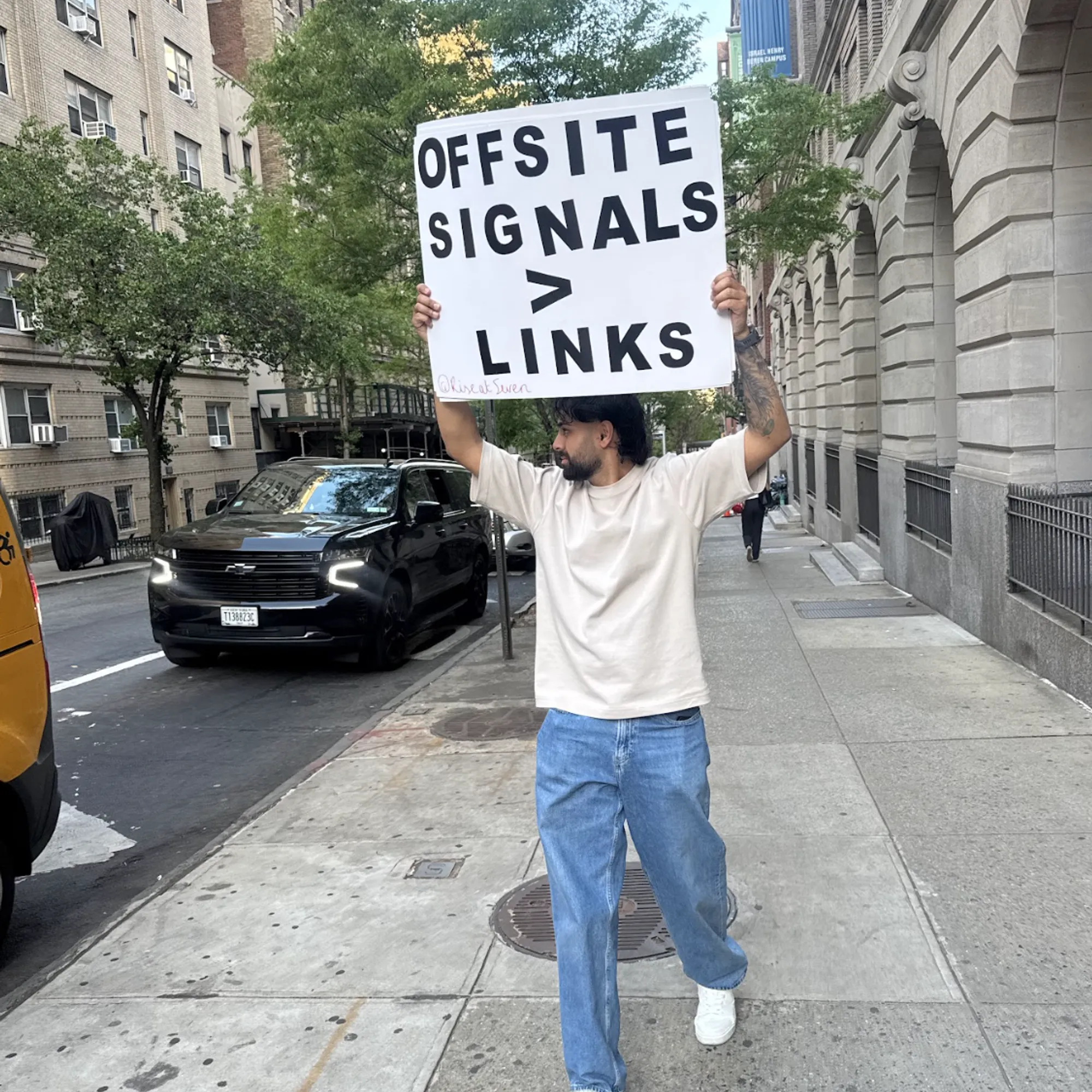
Google's new link attributes: Everything you need to know!

Danny Sullivan and Gary Illyes of Google announced yesterday that they have just released two new link attributes. These attributes are ‘sponsored’ and ‘ugc’.

Alongside releasing the new link attributes, Google also gave an updated statement on the use of the nofollow attribute.
This included confirmation that the nofollow attribute should be used when you want to link to a page without passing on any type of endorsement. However, they then went on to say “This has now changed. All the link attributes — sponsored, UGC and nofollow — are treated as hints about which links to consider or exclude within Search.”
So with this, Google will be using these link attributes as hints of how to treat the links, as opposed to an exact directive.
Directives vs Hints
Hints: Canonical links can be classed as a hint, as they are used to try and tell search engines which is the ‘master’ version of a page. However, pages with a rel=canonical element can and are indexed by Google if they believe that the page offers more relevance and quality to users than your chosen canonical.
Directives: A no-index tag is a directive as Google will see this attribute and, most likely, respect your choice. There may rarely be times when this is overruled by Google, but usually only in cases where conflicts exist.
The above examples show the differences between a hint and a directive when it comes to search engines. To summarise, hints are your way of trying to tell the search engine what you believe is the best decision, but ultimately, the decision is theirs. Directives hold a much stronger authority and will be respected by search engines unless they find conflicting signals.
It has been argued for a while now that the nofollow attribute was treated as more of a ‘hint’ than a directive due to many businesses and agencies, ourselves included, seeing huge boosts to search visibility and organic performance when nofollow links have been secured.
Should I implement these new link attributes?
For a vast majority of brands, there really isn’t any need to implement these new link attributes.
Implementing the rel=ugc attribute will only really need to be looked into for any websites that contain a forum or gain a large number of spam comments that can include links within them. If you have a blog that gets occasional comments on your posts, where a user has the ability to include a link to their website, but the comments you get are genuine and offer value to your post and it’s readers, then there is no need to think about implementing this attribute.
The rel=sponsored attribute will be important to a larger number of websites but will mainly affect blogs and news websites. This attribute should be used to tell Google that the link itself has been paid for, whether in monetary value or gifting products/services, helping them understand that the link itself was not included purely for the benefit of adding additional quality for the readers.
Does this change my link building strategy?
No. The only way this should change your link building strategy is if you don’t currently engage in any link building.
If you don’t currently build links, then all this update means is that you should think twice about trying to build a large number of links through comments and forums or paying for sponsored links, which you should have thought twice about anyway.
For anyone currently building links, you should continue as you already are. The updates to how Google will treat the nofollow attribute may actually bring further benefits to the links you have already built.
Does this change how internal nofollow links are treated?
Quite simply, no, this does not change how internal, and external, nofollow links are treated, in most cases.
Danny Sullivan, Google’s public search liaison, tweeted this following the announcement:
Should I implement these new link attributes?
For a vast majority of brands, there really isn’t any need to implement these new link attributes. Implementing the rel=ugc attribute will only really need to be looked into for any websites that contain a forum or gain a large number of spam comments that can include links within them. If you have a blog that gets occasional comments on your posts, where a user has the ability to include a link to their website, but the comments you get are genuine and offer value to your post and it’s readers, then there is no need to think about implementing this attribute.The rel=sponsored attribute will be important to a larger number of websites but will mainly affect blogs and news websites. This attribute should be used to tell Google that the link itself has been paid for, whether in monetary value or gifting products/services, helping them understand that the link itself was not included purely for the benefit of adding additional quality for the readers.
Does this change my link building strategy?
No. The only way this should change your link building strategy is if you don’t currently engage in any link building.If you don’t currently build links, then all this update means is that you should think twice about trying to build a large number of links through comments and forums or paying for sponsored links, which you should have thought twice about anyway.For anyone currently building links, you should continue as you already are. The updates to how Google will treat the nofollow attribute may actually bring further benefits to the links you have already built.
Does this change how internal nofollow links are treated?
Quite simply, no, this does not change how internal, and external, nofollow links are treated, in most cases.
Danny Sullivan, Google's public search liaison, tweeted this following the announcement:
Google made clear in their announcement that it is not compulsory to update your links with the new attributes. They will still treat the attributes the same as they currently do but use it as a hint rather than a directive.
This indicates that Google are looking to take more control of how they can treat links as a company, as opposed to simply following a directive chosen by webmasters.
News websites are notorious for adding nofollow to all links across the website, regardless of if the link is editorial or within a comment. These updates signify that Google are wanting the opportunity to pass link equity through editorial links included on large news websites.
These links should pass value, as the press have decided that the link is adding relevance to their readers and, therefore, search engines should also be able to attribute that website with link equity.
Stephen Kenwright, co-founder and technical director of Rise at Seven, summed this up perfectly in a recent tweet.
This recent announcement is great news and is the next step in Google taking actions to improve the quality of results for searches whilst clamping down further on black/grey hat SEO techniques.
There are many ways to look at these updates and you will find many conflicting opinions on what they mean and why they have been created. In my opinion, this all stems back to problems Google had when websites could rank number 1 for a term purely based on the number of links they had.
To counteract this, Google released the Penguin algorithm to try and penalise sites who were buying/spamming links in order to gain higher positions in search results. In theory, this did work and helped give users a much better quality of results.
However, we then started to see websites attribute all outbound links with the nofollow attribute, likely to be a PageRank hoarding tactic, especially for most of the big newspapers. Back in June of this year, the Daily Mail lost around 50% of its daily traffic after a Google algorithm update.
Personally, I feel like this is Google’s next step in trying to make links a more reliable ranking factor again! Essentially wanting webmasters to indicate to the crawlers whether a link is a genuine sign of trust and authority or whether it’s been paid for/created by a user for spam purposes.
There is still an abundance of people commenting on forums and websites purely to gain a link to their website, so using links holistically as a ranking factor would still have small issues arise.
Google putting effort and resources into how it can view and process links, then they are still an important part of an SEO strategy and still hold weight as a ranking factor.
Google is clearly investing in how they can better understand links across the web. Rise at Seven are confident that links are the biggest single ranking factor, therefore, search engines having an understanding of how and why people link to each other is critical in ensuring they can provide the highest quality search results to its users.
You can find Google’s official statement for these updates here – https://webmasters.googleblog.com/2019/09/evolving-nofollow-new-ways-to-identify.html
















